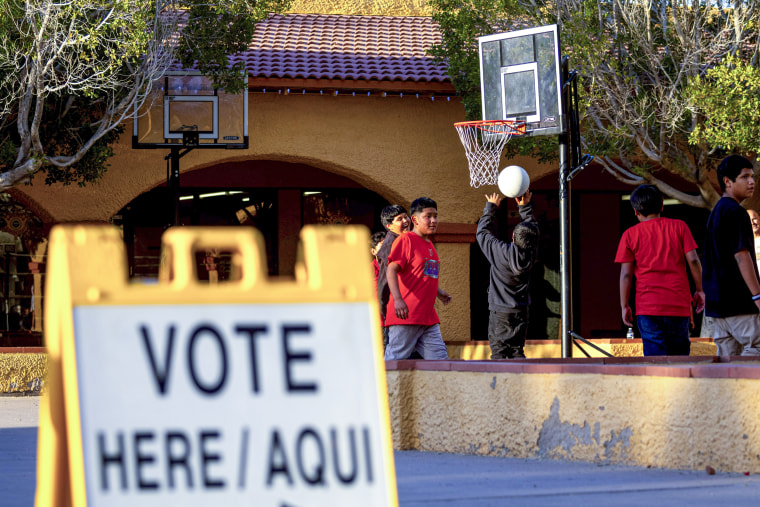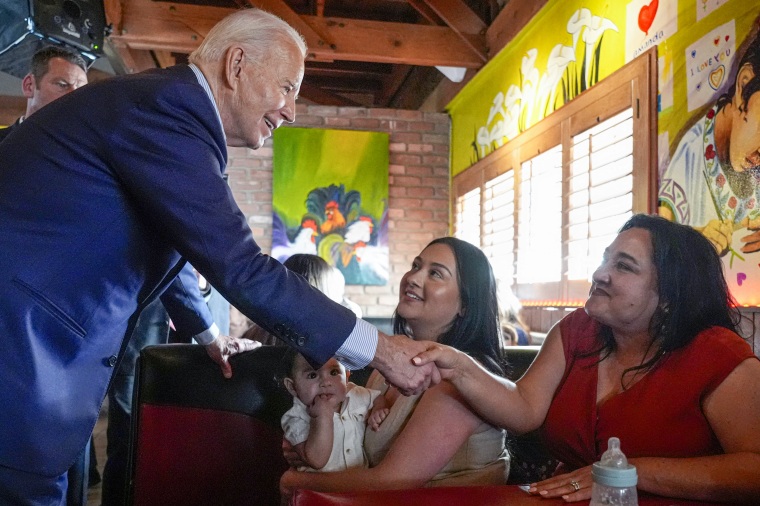UnidosUS backs Biden, Gallego in Arizona and puts focus on ballot measures

The largest Latino group in the country endorsed President Joe Biden in Arizona on Tuesday and said the group will also work to turn out voters to influence potential ballot measures on abortion, minimum wage and immigration. These measures, the group says, are as important in driving Latino voters to the polls.
Janet Murguía, president of UnidosUS and its political arm, UnidosUS Action Fund, threw the group’s support behind Biden and Vice President Kamala Harris and endorsed Rep. Ruben Gallego in his U.S. Senate race and Raquel Terán and Kirsten Engel in their House races. All are Democrats.
Proposed measures in the highly competitive state include asking voters to legalize abortion and to increase the minimum wage. The Legislature also was scheduled to vote Tuesday on whether to put on the ballot a Republican-backed immigration measure with several proposals, including one to create a state law similar to a Texas law that allows police to arrest people in the country illegally and judges to deport them.

“We are looking at this state in a comprehensive way,” Murguía said. “Of course the national presidential election is crucial to us, but we see opportunity to leverage the turnout for representation in Congress … and beyond that it’s those key issues that are going to impact our community, minimum wage … and then the ongoing battle that we’re in for women’s reproductive health rights.”
Arizona Republicans won a state Supreme Court decision to enforce an 1864 near-total abortion ban and had fought efforts to repeal it. The governor has signed a repeal of the law after a handful of Republicans joined Democrats to pass it.
Endorsements, Murguía said, can be leveraged not for just one candidate but also to benefit the community on several fronts across candidates and several issues.
UnidosUS announced its endorsement as the state is nearing a boiling point over immigration. The battle is reminiscent of the atmosphere that reigned more than a decade ago because of the anti-immigrant measure SB 1070, which allowed police in the state to question people about whether they were legally in the country for any reason. Much of that law, known as the “Show Me Your Papers” law, was struck down by the U.S. Supreme Court, which ruled immigration enforcement is a federal, not state, authority.

At the same time, Joe Arpaio, then the sheriff of Maricopa County, was using racial profiling as part of an anti-immigrant campaign that included dressing detained migrants in pink underwear and holding them in tent camps in the hot weather.
UnidosUs joined other organizations in boycotting the state, which led to lost tourism revenue and business sales.
“This ballot measure would take us backward, not forward,” Enrique Davis Mazlum, Arizona state director for UnidosUS Action Fund, said about the proposed immigration measure. “If approved, it opens the door to discrimination, including racial profiling for immigrant and Latino Arizonans in places where our community should feel safe, like schools, churches and hospitals.”
Murguía said the organization and others are “better prepared to push back” against measures seen as harmful to the Latino community.
“I think we found our voice and our vote matters, and we have a record of success when we come together and use both,” she said.
The National Association of Latino Elected and Appointed Officials, NALEO, has projected that 855,000 Arizona voters in the November election, or 1 in 4, will be Latino.
About 814,000 Arizona Latinos voted in 2020, up from 543,000 in 2016, according to UnidosUS’ Hispanic Electorate Data Hub.
Biden won Arizona by 10,457 votes in 2020, and Latino voters were seen as critical. His victory flipped the state, which had historically been red. Although Biden won a majority of Hispanic voters, Donald Trump made inroads, and polls suggest he could make a better showing this election.
UnidosUS, with Voto Latino, Mi Familia Vota and Latino Victory Project, plan to spend a combined $50 million on registration, canvassing, media buys and voter turnout. Davis Mazlum said they will particularly target people without strong histories of voting in urban areas and in communities on the U.S.-Mexico border.
For more from NBC Latino, sign up for our weekly newsletter.







